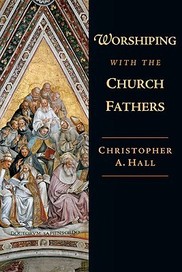posts
|
In the Fall 2010 edition of the Criswell Theological Review, I had the privilege to review this book by Christopher Hall. I am looking forward to participating with Prof. Hall next month at the Evangelical Theological Society (see p. 40) annual meeting in a section called "Adam, Eve, and the Fall in Patristic Exegesis."
Worshiping with the Church Fathers. By Christopher A. Hall. Downers Grove, IL: Intervarsity Press, 2009, 280 pp., softcover. Worshiping with the Church Fathers is the latest work by Christopher A. Hall, who presently serves as chancellor at Eastern University in St. Davids, PA. A recognized scholar in patristics, Hall is also the associate editor of the Ancient Christian Commentary on Scripture and has authored two other books--Reading Scripture with the Church Fathers and Learning Theology with the Church Fathers. In the introduction, Hall relates that he originally planned to call the book Praying with the Church Fathers (p. 12). However, after further reflection, he chose to include other aspects of patristic spirituality, which led to the title change. In the first of three parts, Hall offers an introduction to and elucidation of the sacraments—baptism (chapter 1) and the eucharist (chapter 2). In part two, which comprises one half of the entire work, he accomplishes his original intent of addressing prayer in the fathers, emphasizing the basics of prayer (chapter 3), unceasing prayer (chapter 4), direction on prayer (chapter 5), and the Lord’s Prayer (chapter 6). In the third section, Hall discusses the call to (chapter 7) and practices of (chapter 8) monastic discipline. Finally, in a brief concluding chapter, Hall invites modern readers—especially busy evangelical Protestants—to consider a “skilled adaption” of the fathers’ views on spirituality and worship (p. 249). Hall’s work shares some similar aims with a few recent works. In light of his discussion on baptism, Hall’s efforts are similar to Ferguson’s Baptism in the Early Church--though the latter is much more comprehensive. Also, due to its emphasis on the spirituality of the desert fathers, the work is also relevant to Harmless’ Desert Christians and Byassee’s An Introduction to the Desert Fathers. Because Worshiping with the Church Fathers is an ancient-future book—one that actively interacts with the fathers for contemporary reflection and practice—the work shares some common goals with other recent projects. Some of these include The Contemporary Church and the Early Church (ed. Hartog), Smither’s Augustine as Mentor: A Model for Preparing Spiritual Leaders, and, of course, Hall’s previous works on how the fathers read Scripture and articulated theology. What are the strengths of Worshiping with the Church Fathers? First, through a generous interaction with various patristic authors, Hall mines the father’s thought on baptism and the eucharist in chapters 1 and 2. His discussion on the inextricable link between baptism and salvation is a faithful account; however, he also challenges the notion of baptismal regeneration by showing how faith and repentance were necessary for early church catechumens (pp. 40-43). Finally, his explanation of Christ’s presence in the eucharist was enriched by further discussion on the Gnostic context in which many church leaders ministered (pp. 52-56). Second, his presentation of early church worship as being diverse and broad—including the sacraments, prayer, and monastic devotion—offers a healthy challenge to modern evangelicals as they contemplate worship. As many today equate worship with music, they will be challenged by the more holistic view of worship that Hall presents in the fathers. Finally, in authoring an ancient-future book, Hall does sound work as a patristic scholar who makes reasonable connections for modern spirituality. The author shares much of his own spiritual journey and invites his readers to also reflect on issues such as unanswered prayer and spiritual disciplines. Though some readers may balk at the interface of scholarship and personal devotion, Hall’s method is very much in sync with the church fathers who saw their intellectual and devotional lives as one. What are the shortcomings of the work? First, while providing a faithful account of the fathers’ view of the eucharist, which emphasizes the real presence of Christ, Hall sounds critical of free church Christians because of their memorial view of the supper (p. 65). In fact, his comments seem to reflect his own journey from conversion in the 1960s Jesus Movement to being an evangelical Episcopalian today. Second, in his otherwise helpful discussion on the challenge of unanswered prayer (pp. 156-70), I was surprised that Hall spent so much time interacting with the thought of Richard Foster in addition to that of John Chrysostom. Though Foster is a fine modern teacher and writer on spiritual formation, Hall seems to abandon the scope of his work—worship in the fathers—in this section. Third, in his final chapter on drawing close to God, Hall offers a litany of quotations from the desert fathers regarding aspects of spiritual discipline (pp. 234-46). While on one hand, these reflections are nourishing primary sources; on the other, they break with the overall introductory pattern of the book, which may result in losing some readers. Finally, after reading through the work and appreciating the diverse nature of worship that Hall presents, I am still not convinced that the title--Worshiping with the Church Fathers--best fits this book. When I hear “worship” in the early church context, my thoughts go to the liturgy and sacraments celebrated within the community of the faithful. As Hall has focused much of his work on prayer (both corporate and private) and monasticism, it seems that this book would better be titled Reflections on Early Church Spirituality or something of that nature. In summary, Hall’s work is an inviting and much needed conversation with the church fathers on baptism, the eucharist, prayer, and spiritual discipline. Students of church history will be stimulated by its scholarship and nourished by its devotional content. As a professor of church history, I have chosen to assign it as supplemental reading for patristics and church history survey courses. Comments are closed.
|
Archives
November 2023
|

 RSS Feed
RSS Feed
